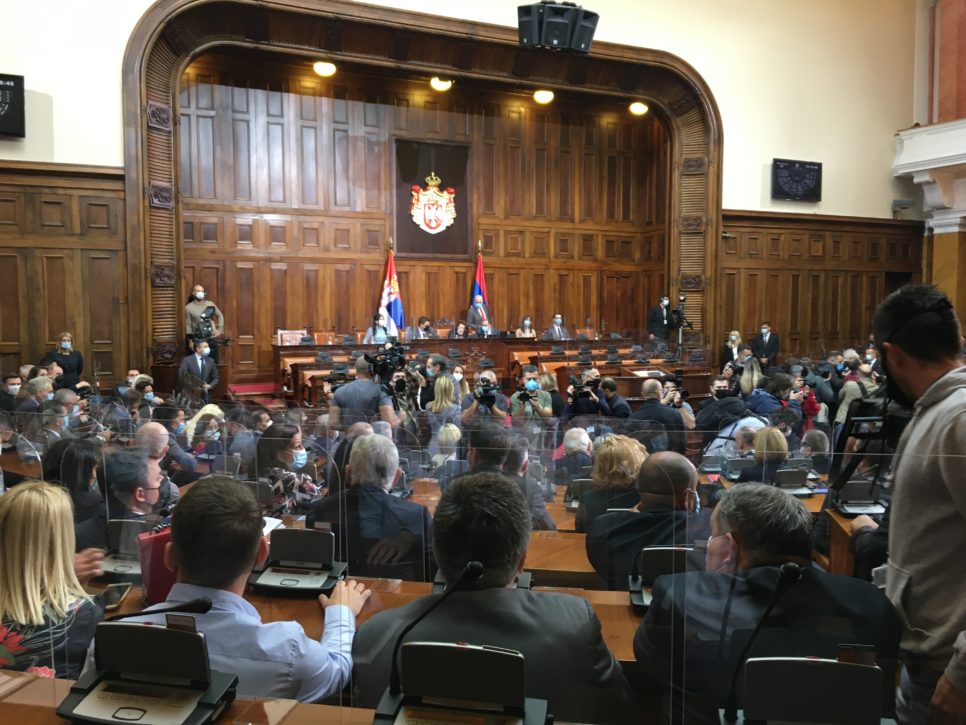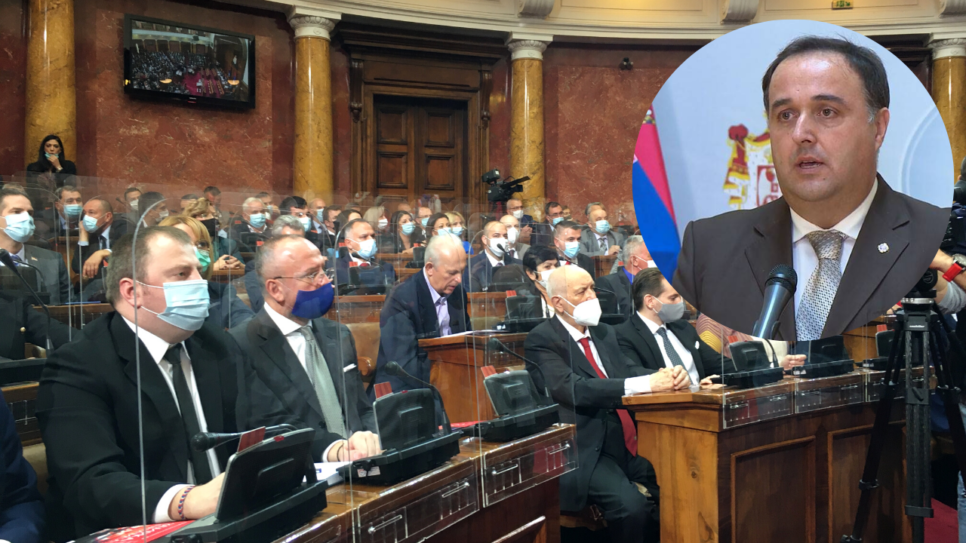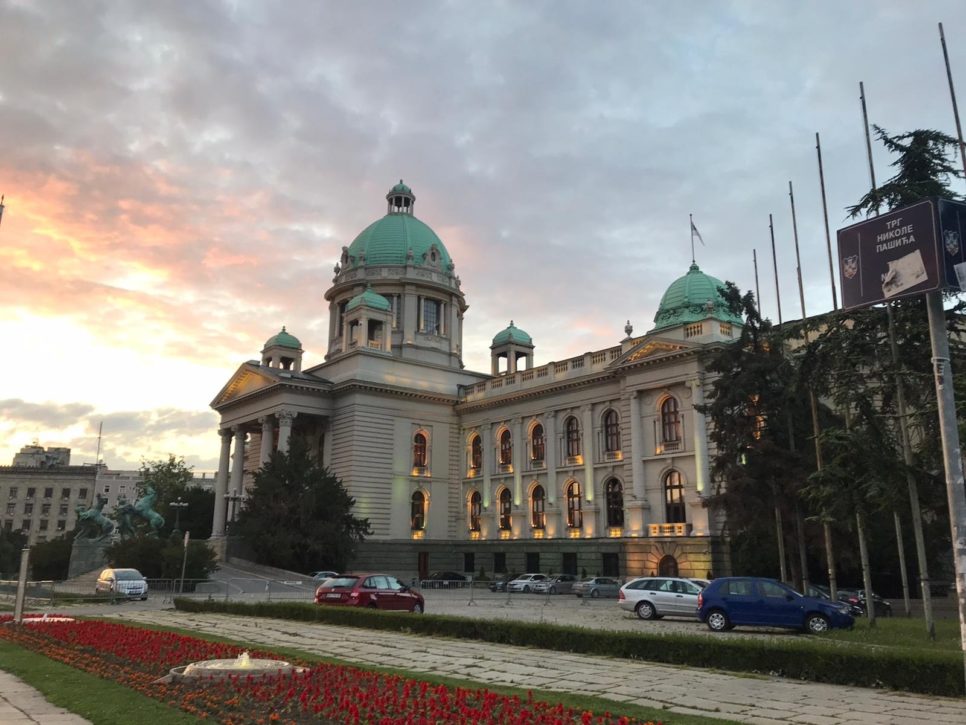The piece of rock of “the land of Serbia” of Dveri MP Boško Obradović; the opposition’s boycott; MPs representing the Serbian Progressive Party to whom the parliament often served as a place for singing praises of Serbian President Aleksandar Vučić and a fierce showdown with their political opponents; the pink underwear Serbian Radical Party MP Milorad Mirčić “drew” at Minister of Transportation Zorana Mihajlović; Progressive Party MP Dubravka Filipovski’s business trip to Strasbourg and her broken English in the Parliamentary Assembly of the Council of Europe; the torn suit jacket of Marijan Rističević; voting at the ring of a bell; hunger strikes and counterstrikes – these are just some of the events that marked the last makeup of the National Assembly.
All at the expense of Serbian citizens.
MPs, according to the law, are entitled to certain privileges – if they are not from Belgrade, the Assembly will pay them to stay at a hotel rated less than five stars, to rent an apartment or pay for fuel if they arrive in their own car. For the duration of parliament sessions, they do not pay for parking their vehicles in three public garages, nor do they pay for public transportation, although very few use the latter anyway.
How much did an MP from your city or town earn?
On this link you will find a database containing the salaries, MP supplements, accommodation, transportation, and business trips in the country and abroad for 402 MPs who occupied seats in the parliament from the beginning of 2016 to the end of 2019.
The database can be browsed by first and last name, party and place of residence of an MP.
CINS has also learned that citizens paid 44.6 million dinars to cover the expenses of 15 MPs who never addressed those same citizens from their seats in parliament. Out of that number, nine spent all four years of their term in office in the Assembly.
Currently an independent MP, until October 2018 the owner of the Lilly drugstore chain, current owner of several companies and former member of the New Serbia party, Mladen Grujić, did not make a single address in the current parliament makeup, nor did he propose a bill, judging by the data presented on the Otvoreni parlament (Open Parliament) website which monitors MPs’ activities. Nevertheless, 2.8 million dinars was paid for the cost of his four-year work in the Assembly, and after the upcoming June 21 election Grujić might end up in parliament again, this time as a member of the Serbian Progressive Party. This MP responded to a CINS journalist’s call with vulgar remarks and then hung up.
An outstanding representative of the Socialist Party of Serbia (Socijalistička partija Srbije) and owner of a company in Montenegro Milutin Mrkonjić never “made a sound” in the last four years in parliament, but he nonetheless “cost” more than five million dinars. He is number 24 on the Socialist Party’s ticket for this year’s election.
His party colleague, director of public company Srbijagas and a vice president of the Socialist Party, Dušan Bajatović, is at the very top of the Socialists’ election ticket. From 2016 to this year, Bajatović spoke at just three out of the total 98 sessions. He is not given a salary, so citizens set aside close to 1.6 million dinars for his term in office, most of it for his MP supplement. Bajatović donated a similar sum to the party in 2016.
Thank you for reposting CINS articles! When doing so, you need to state that you have taken the story over from the Center for Investigative Journalism of Serbia, and provide a link to the article you are reposting.
More information at: cins.rs/en/terms-of-use
“I am a member of our delegation to the Parliamentary Assembly of the Council of Europe and I was a committee chairperson there for two years, now I am the chairperson of a subcommittee, I have reported on several topics. I am also the deputy chairperson of our European Integration Committee and I traveled regularly because of that. When I travel, my airplane tickets and accommodation are paid for and I have absolutely no earnings there,” Kovač explains.
Another candidate for the next parliament is Dragan Šormaz, a member of the Serbian Progressive Party (Srpska napredna stranka), for whose salaries and expenses 11.2 million dinars was paid in the period from 2016 to late 2019, which put him in second place in terms of payments in the CINS database called How Much Does an MP Cost? During that time, Šormaz was active at 17 out of the total 98 parliament sessions. Although some MPs asked to speak much more frequently, that does not mean they actually worked more, Šormaz explained to CINS:
“I am someone who does not ask to speak according to the Rules of Procedure. (…) You have MPs who ask to speak according to the Rules of Procedure, you can [ask to speak] all the time about some violations [of the Rules of Procedure] and that way have thousands of requests, that does not mean they did anything specific. Second, the Assembly is not just a plenary session. The Assembly is committees, the Assembly is delegations.”
He adds that he tries to work like they do in modern parliaments – in committees:
“I work on committees. That is how it is done in the American Congress, in the American parliament. There work is done in those committees, commissions, boards. That’s basically where the most work is done. When you come to a plenary session, everything is already done.”
A vice president of the Serbian Progressive Party, Marija Obradović, is also running in the election. However, judging by her official website, Obradović was more active in her party than she was in the Assembly, where she spoke at 14 sessions in four years. Citizens paid her 8.3 million dinars for her total contribution to the work of the institution with the power to change the Constitution and laws of this country.
Among the record holders in terms of payments in the CINS database is also Hadži Milorad Stošić, formerly of the Party of United Pensioners of Serbia and now on the Serbian Progressive Party ticket. In this past parliament composition he represented the people at the stand 13 times, with expenses totaling 8.2 million dinars.
Among the best paid representatives of the people are also MPs who are not in power.
For the work of Gordana Čomić, Deputy Speaker of the National Assembly and until recently a member of the Democratic Party (Demokratska stranka), a sum of 8.8 million dinars was earmarked in the last four years, which makes her the “most expensive” MP of the party. Čomić is vying for a seat in parliament this year as well, now representing an organization called Serbia 21.
When asked how she would describe her work in the parliament, as well as how much the MPs had actually managed to change, Čomić replied that she was not happy because they had not eliminated the perception that they were “a useless group of people.” The consequence, she adds, is that people do not know what an MP can do.
Unlike Čomić, who asked to speak at 37 sessions, the least active Democratic Party MP in this past makeup was Vesna Marjanović. From the beginning of 2016 to the start of the parliamentary boycott in February 2019, she spoke on behalf of the citizens at just four sessions. Nevertheless, the boycott did not affect her MP earnings, and so during the first year of the boycott Marjanović was paid 1.4 million dinars, 15,000 more than in 2018.
Marjanović told CINS that the party had decided that during the boycott the MPs would not go to the Assembly or to any committee sessions, and that they could only travel to meetings of parliamentary delegations, because that was “a way for a different voice to be heard abroad.” They could not even ask MP questions, which she described as “anti-constitutional and illegal.”
However, she thinks the importance of an MP’s work should not be measured in minutes, because some activities are not publicly visible:
“For example, I was very active while I was the chairperson of the (Culture and Information) Committee, I talked to non-governmental organizations, media associations, I tried to prevent the election of a member of REM as a representative of non-governmental organizations. Those are things that are not very visible.”
As the party she is a member of is boycotting the upcoming election, Marjanović is not in the race for a parliamentary seat.
Dušan Vučićević, a docent at the Faculty of Political Sciences who teaches Elections and Election Systems and The Political System of Serbia, believes that MPs’ salaries are low and should be raised so as to enable MPs to be independent and to give the parliament a real control function. However, he also says there are grounds for criticizing the current salaries of these MPs because they are not doing enough work.
“The fundamental problem with what you are talking about is that you find and show the public (the problem) and still the public, come election time, does not have the option of punishing the MP who is doing that – if they have put them at the top of the ticket, they will enter the parliament again,” explains Vučićević.
He recalls that a voter votes for an election ticket, i.e. for 250 names as a whole, and so an MP who wins a seat in the parliament “absolutely does not feel responsible to voters, because it was not thanks to their votes that they ended up in parliament, but rather thanks to the will of the party leaders or a group of people around the leader.”
How Much Did Citizens Pay the Whips
The president of the Republic of Serbia calls a general election 90 days prior to the expiry of term in office of the current makeup of the National Assembly, so that the election wraps up within the next 60 days. According to the Law on the Election of Members of Parliament, citizens vote for election tickets, and so MP mandates are distributed proportionately to the number of votes won by the tickets.
The MPs who won seats in the parliament in 2016, according to the parliamentary Information Booklet, were entitled to a monthly salary of 68,297 dinars, as well as to an MP supplement of 27,320 dinars, i.e. 40% of their salary, as a benefit for doing that job. As of October 2019, according to daily Politika, the basic MP salary has been raised to 82,869 dinars.
According to the CINS database, 31 MPs in the observed four-year period received only MP supplements from the Assembly, because they get their salary elsewhere.
For MPs not living in Belgrade, the Administrative Committee’s Decision on the MP Fee envisages two options – that they rent accommodation in the capital which costs up to 35,000 dinars (around 300 euros) per month, or that they travel to Belgrade and rent a room in a hotel that is not first class, as necessary. If they travel to Belgrade in their own car, MPs receive money for the fuel, while those who rent an apartment are entitled to a special supplement for living away from their family.
MPs are entitled to business trips in the country and abroad, where their travel and accommodation costs and daily allowances are covered. Between 2016 and 2020, MPs spent 103 million dinars on such trips.
New or old faces in the Serbian parliament should be known after the election called for June 21.
Marinika Tepić is the head of the Caucus of Independent MPs in the parliament and during her term in office in the last parliament makeup she changed three parties. The sum paid for her salary and expenses totaled 5.9 million dinars. Besides a salary of 3.2 million, Tepić also received 1.2 million for fuel, whereas in 2016, while she was a member of the League of Social Democrats of Vojvodina, she also received 236,000 dinars for business trips abroad, including travel advances, transportation, accommodation and daily allowances.
The Serbian Radical Party frontman, Vojislav Šešelj, spent 4.7 million dinars over the course of four years in parliament, with the bulk of the sum being his salary. Šešelj often used the parliament to throw insults at his colleagues in parliamentary seats, while in 2018 he stamped on the Croatian flag, cursing all the while.
Denizen of Niš Goran Ćirić, the Democratic Party whip, from 2016 to the end of 2019 cost the citizens 2.9 million dinars as an MP. During that time, he collected 1.5 million dinars for fuel on the Belgrade–Niš route, even though he lives in the capital city, where he also works as a special advisor at the Post of Serbia. Soon you will be able to read about MPs who have real estate in Belgrade, yet collect money for fuel expenses, on the CINS website.
The head of the Serbian Progressive Party in the Serbian parliament is Aleksandar Martinović. The data at CINS’ disposal show that he does not receive a salary in the parliament, rather only the MP supplement (roughly 30,000 dinars per month). He gets another 234,000 dinars in his account each month from other jobs, and since he is from Ruma he also collects a fuel fee when he come to the Assembly. During this term in office, he “cost” the citizens 2.3 million dinars, without taxes.
According to the data from the CINS database, in the four parties that had the biggest number of MPs in the course of the four years observed, a Serbian Radical Party MP cost the most on average, as 4.4 million dinars of citizens’ money was spent on their salaries and expenses.
Behind them was a Democratic Party MP, for whom 3.4 million dinars was paid, on average.
MPs from the ranks of the Progressives each cost 3.3 million dinars on average, while the Socialist Party MPs cost 3.2 million dinars each.
Made possible by support from the Dutch Ministry of Foreign Affairs





What do you think